The Crown Season 6: A Long & Hearty Goodbye To Television Royalty
This is #CineFile, where our critic Rahul Desai goes beyond the obvious takes, to dissect movies and shows that are in the news.
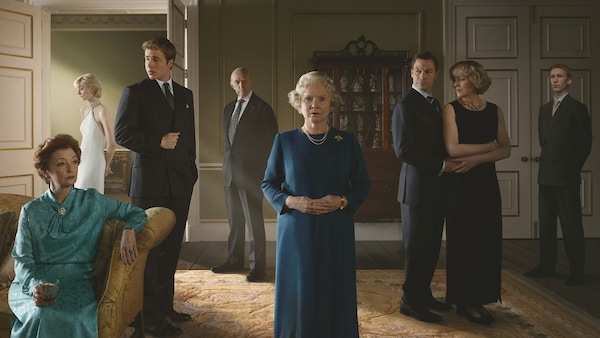
Last Updated: 04.31 PM, Dec 16, 2023
MIDWAY through the final season of The Crown, one of the many impossibly eloquent characters of the British monarchy uses the term “deja vu”. It’s happening all over again. He could very well be describing our relationship with the long-running Netflix series itself — which has spanned six seasons, seven real-time years, six decades of a Queen’s reign, three generations of royals, and three formidable lead actresses and ensembles. When the first season streamed in 2016, it altered the DNA of a historical television drama — cinematic, stylish, elegant, regal, specific, mercurial, all at once. The bar had been raised. A dramatised account of the royal family as it was, it still felt like a privileged peek into the inner workings of a notoriously private institution. It transcended front-page gossip and controversies, and acquired an artistic life of its own.
Over time, however, the series has come to be defined by a sense of repetition and familiarity. A narrative deja vu. The odd show-stopping episode or character aside, there has been an inbreeding of themes. The self-conscious metaphors have ranged from rats to birds to hunting to moon-walking to the gravitational force of the moon. The closer the series has gotten to the 21st century, the harder it has gotten to process the individualism of its setting. Every season is steeped in the same conflicts: Tradition vs modernity, insider vs outsider, death, succession, royal existentialism. The generational trauma comes like old wine in newer bottles: Stubborn fathers, resentful siblings, fragile sons, rueful lovers, tragic outliers.
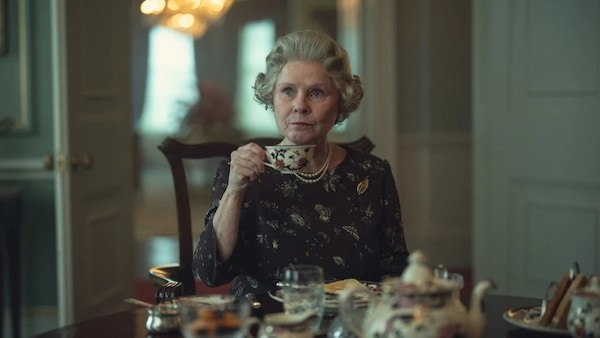
At the end of it all, if Queen Elizabeth II — young, middle-aged and old — isn’t stoically anxious about the relevance of the monarchy in a modern world, is it even The Crown anymore? If Prince Charles isn’t desperate to take over from his mummy, if Princess Margaret isn’t envying the romance of Charles and Camilla or empathising with the other “number 2” Prince Harry, if Prince Philip isn’t going through a crisis of purpose or empathising with other partners going through a crisis of purpose, if ‘commoners’ aren’t scheming to get their sons (Dodi Al-Fayed) and daughters (Kate Middleton) married into the royal family, if Prime Ministers don’t grow to respect their enigmatic and unreadable sovereign, if the Queen doesn’t reflect on her legacy or reluctantly adapt, is it even The Crown anymore?
But that’s the thing about The Crown. Uneasy lies its head, but the sleep has never been sounder. Its endurance — against the odds, against all logic and sanity, against the influx of new-age entertainment — is the whole point. For better or worse, the show’s abiding relevance in today’s pop-cultural space reflects the longevity of Queen Elizabeth II and the British monarchy. Not everyone likes them, but they’ve stayed, turning repetition into the sort of endless drill that athletes use to hone their skills. The cyclical instincts reveal a show that goes to a film-making gym — repeating those revs and leg days and parables and cardios — to become fitter and more muscular, not more predictable. Familiarity is not so much a flaw as it is the language of sovereignty itself. Embracing inertia in a fast-moving world is its own form of motion.
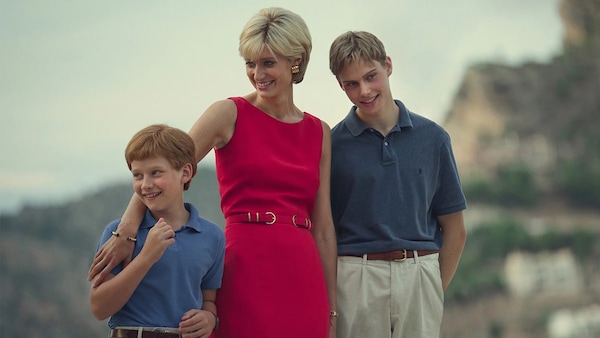
The storytelling isn’t critical of the monarchy but it isn’t exactly adoring either — if anything, it is sympathetic towards a rigid institution that survives because it has no choice. It admires not the antiquity itself so much as the courage to stay like that. Prince Charles says ‘deja vu’ in context of how his older son, William, suddenly starts to acquire the blinding fame (and good looks) of his late mother. It’s the same feeling one had when a martyr-like Philip secretly envied a young Diana for breaking out of a doomed marriage to live on her own terms. It’s not a here-we-go-again feeling, though. It’s more of a comforting din, the kind that convinces you that replication is the best form of flattery. These are, after all, people who are so consumed by an image that they must tolerate the various reflections of it.
Season 6 covers more contemporary events — the deaths of Diana and Princess Margaret and the Queen Mother, Tony Blair’s leadership, Prince William’s university years and romance with Kate Middleton, and Prince Charles’ wedding with Camilla Parker Bowles. It has the (dis)advantage of being more current and recognisable — of being measured against the records of public memory. Yet, it’s as solid a last season as The Crown could have wished for. There’s a solemnity about it, one that promises a continuity that’s as inevitable as it is threatening. It has one eye on the future, sowing the seeds of what we already know today — the Prince Harry exile, his spat with the family, the Queen’s wavering idea of duty, the William-Kate marriage.
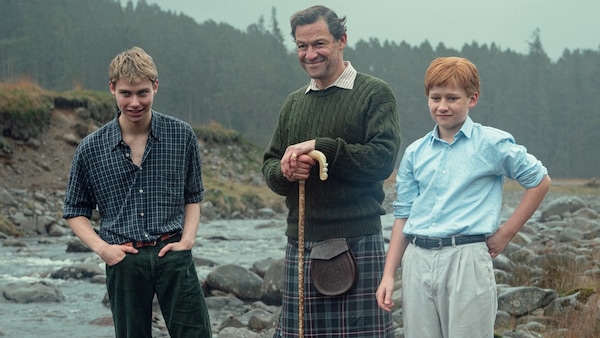
There are a few tropey missteps — like the lazy characterization of Mohamed Al-Fayed (who sounds like the villainous Skinner from Ratatouille), the use of Diana’s ghost in pursuit of closure, the starry-eyed manipulations of Kate’s mother. But throughout its ten episodes, there’s a nagging sense of individual characters stumbling towards a single and shared truth: Royalty is the burden of inheriting fame without really earning it. Imelda Staunton plays the Queen as the world has known her — unlike Colman and Foy, who played the Queen with no real references other than history itself. Staunton absorbs the pressure and disappears into the role, reminding us of a face we’ve grown up seeing while also isolating herself as a character who is caged by her own privilege. It’s a remarkable performance, one that revolves around distinguishing the person from the performance. Elizabeth is tired of losing markers and memories, but she’s in so deep that she’s not sure she knows any other way of living.
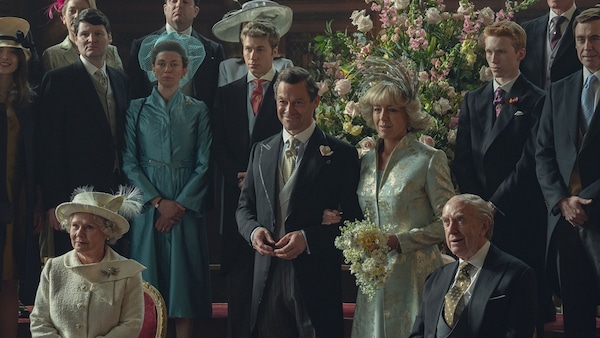
There are a few standout episodes. For instance, William’s attraction towards classmate Kate has distinct Normal People vibes. Princess Margaret’s health problems are rooted in a wonderful melancholy — one that reveals much about Elizabeth and the carefree girl she had to ‘kill’ to ascend the throne. The finale is well staged, because it ties into a previous episode where Philip assuages his own guilt as a father by repairing a rift between William and Charles. The three generations of men in the same frame are telling, because it reveals a freedom to be human enough to break and mend attachments. These are fathers and sons, men and boys.
The wistful finale features three generations of monarchs, too: Imelda Staunton’s Elizabeth finds herself conversing with Olivia Colman’s Elizabeth and Claire Foy’s Elizabeth. The three Queens (but one woman) in the same frame are telling, because it reveals a human who could never afford to forge attachments with anyone but herself. There are no husbands or sons or daughters or grandkids or loyal advisors around her — it’s just who she is, who she was, and who she had to be. It is The Crown in one frame: unchanging, resigned, durable, and an exit disguised as a goodbye.
